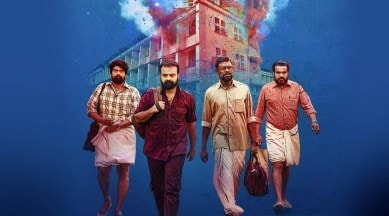Click here to follow Screen Digital on YouTube and stay updated with the latest from the world of cinema.

Rang De Basanti was a movie that captured the revolutionary spirit of India from the perspective of a time when Indian politics was in the clutches of corrupt politicians. The movie’s relevance hasn’t diminished a bit even after 16 years of its release as Indian politics has been muddled even more with venomous right wing ideologies of hatred and segregation in addition to corruption. If Rakeysh Omprakash Mehra’s movie was a strong political statement which told the story of a few students from Delhi university who assassinate the defense minister responsible for the death of their dear friend, and fearlessly claim their act of revolution, Pada, directed by Kamal KM, derives inspiration from a real-life incident that happened in Kerala 25 years ago to expose the unjustifiable and oppressive policies implemented by changing governments to uproot indigenous communities from their own land – an ongoing phenomenon in every part of the country.
It is always a challenging job to make a movie out of a real-life incident and keep the viewers engaged, especially when the details of the whole incident is available in the public domain. Director Kamal KM has made no compromises while depicting the incident that shook the political hierarchy of Kerala 25 years ago when four members of Ayyankali Pada held the Palakkad collector hostage, demanding the withdrawal of the revised tribal bill passed by the then left government under EK Nayanar. The movie is a powerful political statement and throws light on the policies of changing governments, be it the left or the right, who diluted the tribal laws over the years in favour of corporate interests by taking away the rights of tribal communities over forests. It was no surprise that every member in the legislative assembly supported the revised tribal bill except for KR Gouri Amma. This led to a few strong willed revolutionaries taking some drastic steps to make their voice of dissent heard.
Pada restages the whole incident that happened on October 4, 1996 with cinematic elements. The research and the filmmaker’s interactions with people involved in the real-life incident has enriched the movie as every scene exudes indignation and fearlessness that can be felt only by those who feel compassion for the voiceless and oppressed. Pada shows the contrast between the most underprivileged classes and the most powerful classes in society. The movie like the real incident shows how a fearless bunch of people with sheer will and determination can shake up the ruling class. The movie raises so many questions about the shallowness in ideologies of governments, especially the left regime who claim to be saviours of marginalised communities like tribals and dalits. In many ways, Pada is relevant as the condition of marginalised communities haven’t changed much as we still see reports of child deaths due to malnutrition and starvation in tribal settlements in Attappadi and other forest regions. Also, we’ve seen the cruel murder of a tribal man named Madhu for the fun of a few ‘privileged’ people. Every so often, the characters in the movie raise their fists and declare ‘this is the resistance of the oppressed’ and it strikes the audience’s mind as we sit in our privileged seats of comfort and watch the situation of the historically oppressed communities.
The narrative of the movie is engaging and perfectly dramatized for the cinematic experience where the viewer will feel the tension with every frame. The thought process of the bureaucrats who run the system and the revolutionaries who were involved in the hostage situation has been brilliantly captured through the amazing performance of every actor who did justice to the roles assigned to them. The whole narrative style of Pada felt similar to the 2019 Brazilian movie Marighella which is a biopic of Brazilian writer and revolutionary Carlos Marighella who died fighting the military dictatorship in Brazil during the 1960’s. Marighella fought for the rights of Afro–Brazilians who were one of the most oppressed communities in Latin America just like the tribals and dalits in India. It feels the story of oppression is same everywhere even if the form of oppression changes.
Pada’s cinematic experience is enhanced by the layered performance of some brilliant actors. Vinayakan, Dileesh Pothan, Kunchacko Boban and Joju George are perfectly suited to play the real life persons from Ayyankali Pada who were involved in the 1996 hostage situation. The four actors reflected the fearless attitude in them with a bit of nervousness which is natural with such an extreme act of revolt. Prakash Raj as the Chief Secretary of the state is another stand out performer. Indrans, Kani Kusruthi, Unni Maya and TG Ravi also deliver the goods.
Sameer Tahir’s cinematography captured the essence and mood of every frame. The realistic shots inside the collectorate and other government chambers really draw the viewer into the situation. Shan Mohammed’s editing made sure the movie doesn’t slow down anywhere. The sound department under Ajayan Adat also maintained the tension and drama of the film.
Click here to follow Screen Digital on YouTube and stay updated with the latest from the world of cinema.